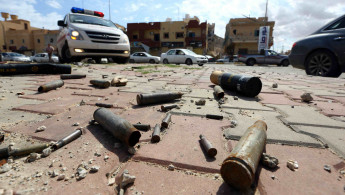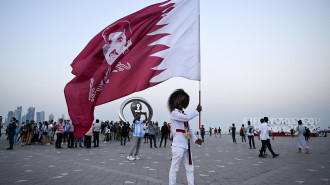Fighting in Sabratha sets tone for Libya's future instability
The coastal town of Sabratha, 70 kilometres from Tripoli, is a principal hub for migrants from across the Middle East and Africa seeking a departure across the Mediterranean.
In the past two weeks, it has become the newest theatre of war.
The battle of Sabratha, in which at least 30 soldiers and civilians have been killed, may provide an example of forthcoming Libyan clashes.
Armed groups linked to General Khalifa Haftar, "the strong man of Cyrenaica", are now fighting here in the western part of the country, an unthinkable situation until recently.
It all began when a vehicle with darkened windows passing by the headquarters of the Operation Room - the official military force fighting the Islamic State group - refused to stop at a checkpoint, sparking a gunfight between troops and the vehicle's inhabitants.
The vehicle belonged to the powerful Anas Dabashi militia, which controls human and fuel trafficking in the area.
The anti-IS Operation Room, created after the 2016 US raid on an IS position in Sabratha, is the offical centre coordinating the fight against IS in Libya. It is run by Colonel Abduljalil, and is a military force composed not of militias but by soldiers who have obtained permits directly from the government chaired by Fayez al-Sarraj.
 |
The arrival of the Operation Room in Sabratha quickly irritated the powerful families of the area, notably the Dabashi clan, who saw the soldiers as a threat to their illegal businesses |  |
The Operation Room in Sabratha is also supported by the Al Wadi Brigade, a Salafi militia which supported military action to free Sabratha from IS cells.
The arrival of the Operation Room in Sabratha quickly irritated the powerful families of the area, notably the Dabashi clan, who saw the soldiers as a threat to their illegal businesses.
The military force, supported by the UN-backed Prime Minister Sarraj has begun to control and guard a stretch of road leading to Tunis, through Ras Ajdir, a key nexus of smuggling routes.
The soldiers arrested traffickers driving trucks full of migrants, and increasingly began to control the coastal highway.
Al-Ammu, the undisputed leader of the Dabashi militia, who is in de facto territorial control of half of Sabratha, ordered his fighters to hinder the work of the soldiers. Local sources report he ordered the kidnapping of soldiers to be ransomed for an end to Operation Room operations in the area.
During the first day of clashes, two militants died. They were identified as Abubaker al-Dabbashi and Sami Jamjoum, also of the Dabashi clan.
"The clashes in town are just the beginning of a war we were long expecting," said one Sabratha resident who asked for anonymity for protection.
"We all expected it could happen. There are a thousand rivalries overlapping - first of all the presence of the military, but now there are also the interests of militias cut off from the agreements with the Italians."
The attack on the checkpoint in front of the headquarters was not a random event but a provocation prepared at least a day in advance, the local added. Al Ammu would have asked his men two days before to equip former military vehicles and heavy weapons.
After four days of fighting, the alliances that divide Sabratha were drawn as the Dabashi clan and Brigade 48 on one side and the Operation Room and the Al Wadi Brigade on the other.
Infrantry Brigade 48 is one of the central players in Libya's recent political and diplomatic life.
It was created at the end of 2016, when the central government of Sarraj decided to create armed units specialised in preventing the smuggling of oil.
Libya: A country controlled by gangs of mobster militias
The Libyan ministry of defence, as reported by journalist Tom Fenoux, signed the agreement to create Brigade 48 at the end of January, around the same time Italy and Libya were signing a Memorandum of Understanding.
Their initial task was to protect oil stations from smugglers and to protect the security of the city.
But the influence of Dabashi has already crept into the troops.
"Brigade 48 is a militia of corrupt soldiers," says one resident. "The Dabashi are in the shadows with Al Ammu's uncle, Hussein Dabashi. They created the militia just to control the city and protect Ammu and [Dabashi] business. Knowing it was about to start a political phase in the fight against smuggling, Ammu's brother, Emhedem, commands the brigade and protects clan traffic.
"They are accredited with the government to receive a formal assignation, but they continue to protect not Sabratha's security, but their family affairs. They just changed their uniforms, but they are always holding the area. First they took part in the trafficking, now they pretend to fight them."
According to this local source, Brigade 48 also has offices in the Mellitah compound - which also houses the Libyan franchise of Italian energy giant Eni - and would take part in the "protection" of surrounding roads.
"The Dabashi thought that getting a deal with the Italians was profitable not only from an economic point of view, but also to let them understand that the Dabashi are the only possible interlocutors to ensure city security and the only ones able to block human trafficking.
"But it was not; they did not consider the interests of militias not involved in the deal who are now rebelling, asking for their share of the deal.
"We all expected it, and it happened."
 |
| Sabratha lies on the far north-west coast of Libya, west of Tripoli |
In the week of the Sabratha clashes, rigid inflatable boats again took to the sea, with more than a thousand migrants captured by the Libyan coastguard and more than 5,000 rescued by relief vessels in the Mediterranean.
Local Libyan sources say that the Elgul militia, which controls Sabratha's city centre, organised the departures of at least eight large boats, precisely at the time when the Dabashi clan was fighting against the Operation Room, to give a strong signal.
Esam Elgul, the militia clan's leader, said he was very disappointed by the agreement allegedly reached between Italian intelligence agents and the Dabashi militia, which is reportedly in line to receive five million euros ($5.9m), and an office in the Millitah compound.
 |
The traffickers first earned ten times what they get now, if they do not get 'reparations' for halting the flow, they will start sending thousands of migrants |  |
"Organising migrants' departures again," says our local source, "means giving a signal not only to the Dabashi clan, but also to Italian diplomacy. It's like saying: 'Here are the heads of the traffickers, and the deals have to be done with every one, not just with the main one, so we retake control of the departures, by hook or by crook.'
"The traffickers first earned ten times what they get now, if they do not get 'reparations' for halting the flow, they will start sending thousands of migrants, who are now still hiding in the warehouses near the sea."
Among the ranks of the dissatisfied here is "the doctor of Sabratha", Mussad Abugrin - a Libyan business tycoon who reportedly runs human smuggling from Sudan. An Italian source suggests that Abugrin has failed to make a deal with Italian intelligence, leading him to order "one of his most trusted men", known as Hatem The Polo, to reorganise migrant boats from the city's coasts.
The dissatisfaction has also reportedly affected more formal diplomatic environments.
Sabratha's military council condemned an official invitation extended by the Italian government to Haftar, which reportedly arrived five days after Sabratha's Mayor Hussein al-Dawadi met the Italian ambassador to Libya.
The Military Council in an official statement denounced the invitation and called on all countries to "stop all legitimate initiatives for those who pursue military action for political gains". It expressed appreciation to the Italian authorities for their support for health institutions at Sabratha, but reserved judgment for "suspicious" unofficial agreements between Italian agencies and local militias.
In the first week of clashes, militias placed snipers on buildings and their tanks in the streets. The Libyan Red Crescent stated that it was impossible to rescue civilians trapped in the neighbourhood and local sources said militants were indiscriminately killing groups of migrants trapped in residential areas.
A group of Moroccan boys tried to contact local and international humanitarian organisations, but no one - after four days - managed to evacuate them.
They write they have been in Libya for three months and have not yet been able to leave; traffickers robbed them of everything they had and beat them repeatedly. Now, they are trapped in a building in the crossfire.
 |
The agreement between Italy and the militias for the control of human smuggling did not work, and has re-aligned the interests of rival trafficking groups who had previously been less important and less dangerous |  |
Sabratha's solution to the clashes is a prelude to what can happen at a national level, and the Operation Room has called for aid to help Zintan militias.
Meanwhile, the armed groups of Zawhia, the Farouq and Kilani militias, are supporting the Dabashi clan.
Twitter Post
|
In the middle there are European diplomats, official Italian agreements, and shadowy "parallel deals".
In Rome, General Haftar met with Defence Minister Pinotti, Minister of the Interior Minniti, the chief of italian intelligence and Eni's managers.
Haftar's interest likely lies in controlling Eni's strategic compound, which since 2015 has been protected by Ahmed Dabashi's militia.
In Italy, Haftar also spoke about the chance to control immigration, asking for helicopters and drones in exchange for bringing down the numbers of migrants fleeing towards Europe.
Sabratha, therefore, seems to be a herald of the country's future difficulties.
And in Sabratha, where the interests of human trafficking and strategic assets such as the Mellitah compound are interlinked, diplomatic relations are being redesigned.
What seems clear is that the agreement between Italy and the militias for the control of human smuggling did not work, and has re-aligned the interests of rival trafficking groups who had previously been less important and less dangerous.
Now the Operation Room claimed full control over Sabratha, some local sources report that the Dabashis - including Ahmed Dabashi, the chief of the militia - are fleeing, though others say Dabashi fighters still hide in many buildings in the city.
What is sure is that the Operation Room is now controlling beaches - but there is still no news on the fate of migrants trapped in illegal detention centres.
The future of Libya, of the government of Sarraj and of the relationship between this government and European allies will depend on the solution to Sabratha's clashes.
Francesca Mannocchi is a journalist who previously reported from the front lines of the battle for Mosul. Follow her on Twitter: @mannochia



